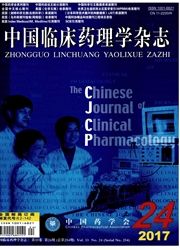

 中文摘要:
中文摘要:
目的观察原发性肝癌组织中Ezrin蛋白表达的临床病理意义及其与患者预后相关性。方法回顾性分析68例肝癌患者的临床资料,用免疫组化法检测患者肝癌组织及远癌正常肝组织中Ezrin蛋白的表达情况。分析Ezrin蛋白在肝癌组织中的表达与临床病理学特征之间的关系及其与患者预后之间的相关性。结果 68例肝癌患者中肝癌组织和远癌正常肝组织Ezrin蛋白的表达阳性率分别为67.65%和16.18%,表达评分分别为(3.31±1.56),(0.56±1.21)分,肝癌组织中Ezrin蛋白阳性率及评分与正常肝组织相比,差异有统计学意义(P〈0.05)。原发性肝癌转移患者癌组织中Ezrin阳性表达率为80.00%(32/40例),原发性肝癌未转移患者癌组织中Ezrin阳性表达率为50.00%(14/28例),Ezrin阳性表达与原发性肝癌转移相关(P〈0.05);与患者年龄、性别、肿瘤分化程度及肿瘤大小等无明显相关性(P〉0.05)。Ezrin蛋白阳性患者中位生存时间为31.10个月,阴性患者平均生存时间为36.10个月(P〈0.05)。结论 Ezrin蛋白在人原发性肝癌中阳性表达率较高,且与患者预后不良有关。
 英文摘要:
英文摘要:
Objective To assess the Ezrin expression in the primary hepatic carcinoma patients and to conduct its prognosis analysis. Methods Complete clinical data of sixty - eight patients with primary hepatoeareinoma was retrospectively analyzed in this study. The Ezrin protein expression in primary hepatic carcinoma tissue was tested by immunohistoehemical assay. The Ezrin protein expression model and its association with clinical characteristics and prognosis were evaluated. Results The positive rate of Ezrin expression were 67.65% and 16. 18% with expression scores of 3.31 ± 1.56 and 0.56 ± 1.21 respectively in cancer tissue and control tissue with statistical difference (P 〈0. 05). The positive rate of Ezrin expression was 80. 00% (32/40) in metastasis status of patients, and was 50.00% (14/28) in no metastasis status. The Ezrin expression was associated with the metastasis status of patients ( P 〈 0. 05 ), but not associated with age ( P 〉 0. 05 ), gender ( P 〉 0.05 ), differentiation( P 〉 0.05 ) and tumor diameter( P 〉 0.05 ). The median survival was 31.10 months in positive group and 36. 10 months in negative group with statistical difference (P 〈 0.05 ). Conclusion Ezrin protein was highly expressed in human primary hepatic carcinoma with significant correlation with the prognosis.
 同期刊论文项目
同期刊论文项目
 同项目期刊论文
同项目期刊论文
 期刊信息
期刊信息
